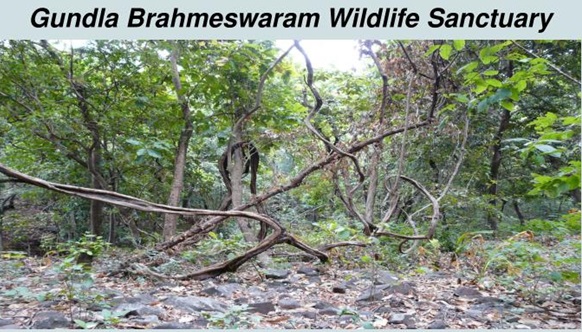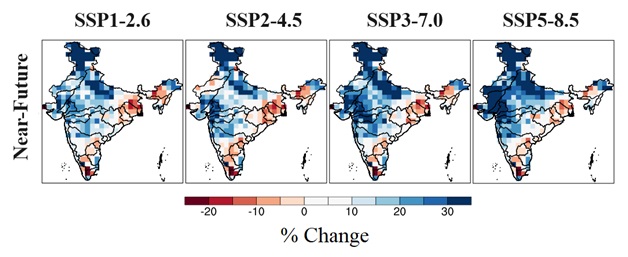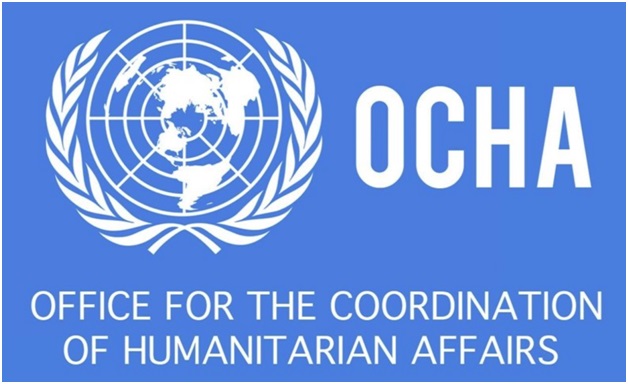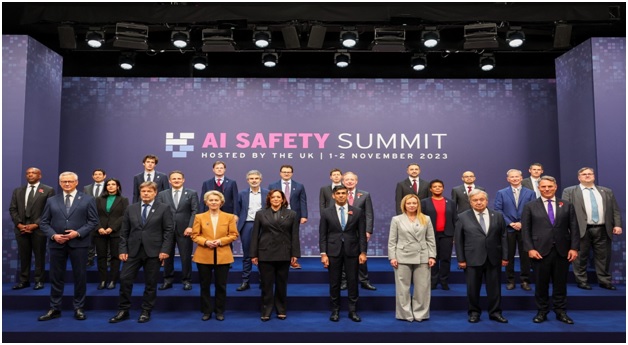ENCORE (NewsOnAIR)

- 03 Nov 2023
Why in the News?
Recently, the Election Commission of India (ECI) has developed in-house software named ‘ENCORE’ designed for efficient candidate and election management.
About ‘ENCORE’:
- The Election Commission of India has designed in-house software for complete Candidate and election management through ‘ENCORE’ which stands for Enabling Communications on Real-time Environment.
- This provides a seamless facility for Returning Officers to process candidate nomination, affidavit, Voter turnout, counting, results and data management.
- The ENCORE counting application is an end-to-end application for returning officers to digitize the votes polled, tabulate the round-wise data and then take out various statutory reports of counting.
- An additional application, the ENCORE Scrutiny Application, allows Returning Officers to scrutinize online nominations submitted by candidates.
- This process involves verifying and marking the status of nominations as Accepted, Rejected, or Withdrawn, facilitating the creation of the final list of contesting candidates and symbol assignment.
- The ECI offers an online portal for candidate nomination and affidavit submission.
- Candidates can create accounts, complete nomination forms, submit security deposits, and plan their visits to the Returning Officer through this portal.
- The Candidate Affidavit portal is designed to display information about a candidate's financial assets and liabilities, offering transparency in candidates' financial disclosures.
- The ENCORE Nodal App serves as a platform for various government departments, including fire, education, police, environment, and CPWD, to issue 'no objection' certificates.
- These certificates are required before granting permission for political parties or candidates to hold rallies, road shows, and meetings, ensuring that all necessary clearances are obtained before public events.
Gundla Brahmeswaram Wildlife Sanctuary (New Indian Express)

- 03 Nov 2023
Why in the News?
In a first-of-its-kind, over 50 grass species were identified during a two-day workshop and survey on ‘Grasses Identification and Grassland Management’ at the Gundla Brahmeswaram Wildlife Sanctuary in the Nagarjunasagar-Srisailam Tiger Reserve (NSTR).
About Gundla Brahmeswaram Wildlife Sanctuary:
- Location: It is located in the Kurnool & Prakasam of Andhra Pradesh with an area of 1194 sq km.
- Located between two important hill passes known as "Mantralamma kanuma" and "Nandi kanuma".
- The Northern part of this Sanctuary forms a major part of the Southern boundary for Nagarjunasagar-Srisailam Tiger Reserve.
- River: The Gundlakamma River stretches across the sanctuary.
- It also has many, mesic sites and ancient rock formations.
- Indicator Species: Tiger, Panther, Wild dog, Bats, Fig trees.
- It was declared a wildlife sanctuary on September 18, 1990.
- Forest Type: Dry mixed deciduous forest, moist dry deciduous, semi-evergreen, dry deciduous scrub forest and dry savannahs.
- Flora: The forest is an adobe to medicinal plants of which 10 are critically endangered, 21 are Endangered and 27 species are vulnerable.
- The plants like Madhuca longifolia, Dellenia pentagyna, Aristolochia indica, Terminalia arjuna, Pithecolobium ducle, Adina cordifolia, Vanda spp; etc; thrive here.
- Fauna: Wildlife like Tiger, Leopard, Flying squirre. angur, jungle cat, panther, tiger, mouse deer, hyena, bonnet monkey etc; are found here.
Hydroclimate Extremes (PIB)

- 03 Nov 2023
Why in the News?
A recent study conducted at Banaras Hindu University explored the impact of global warming on hydroclimate extremes in the Indian River Basins (IRBs).
About Hydroclimate Extremes:
- Hydroclimatic extremes are severe events with significant impacts on both human societies and ecosystems.
- These events encompass phenomena such as floods, droughts, heat waves, and heavy rainstorms.
Key Findings:
- The research utilized highly detailed simulated precipitation data derived from the Coupled Model Intercomparison Project-6 (CMIP6) experiments.
- The study's results suggest an anticipated rise in the frequency of extreme rainfall in the Western Ghats and Northeast River basins.
- Additionally, heavy rainfall intensity is predicted to increase in the Upper Ganga and Indus basins.
- The research sheds light on an agricultural drought in the lower Ganga basin, attributed to a reduction in average rainfall.
Importance:
- This study underscores the importance of policymakers creating strategies to address both excess and shortage of water resources.
- It anticipates a 4% to 10% rise in intense rainfall in the western regions of Indian river basins, along with noteworthy shifts in precipitation patterns in specific areas.
- These alterations in hydroclimate extremes could greatly impact agriculture, public health, and socio-economic conditions.
- Furthermore, the research identifies critical areas prone to urban flooding in densely populated cities, emphasizing the need for policymakers to devise tailored climate adaptation and mitigation plans.
- These should encompass policies related to water management and emergency services to mitigate the risks posed by extreme events in these basins.
UN Office for the Coordination of Humanitarian Affairs (OCHA) (TOI)

- 03 Nov 2023
Why in the News?
??The UN Office for the Coordination of Humanitarian Affairs (OHCA), on Friday, launched an emergency aid appeal seeking $1.2 billion to help some 2.7 million people in Gaza and the West Bank.
About the UN Office for the Coordination of Humanitarian Affairs (OCHA):
- OCHA is part of the United Nations (UN) and focuses on humanitarian issues.
- It coordinates and leads UN responses to humanitarian crises worldwide.
- It was established by the General Assembly of the United Nations in 1991.
- OCHA's goal is to save lives, protect people, and help those affected by disasters and conflicts.
- It works with governments, non-governmental organizations (NGOs), and other partners to respond to emergencies.
- It provides funding to support relief efforts in crisis-affected regions.
- There are two types of pooled funds:
- The Central Emergency Response Fund (CERF) can provide financial support for emergencies anywhere on the globe.
- Country-Based Pooled Funds (CBPFs) are specific to individual countries.
- These funds operate from two central hubs located in Geneva and New York, serving as global operational centres.
- The office works to ensure that humanitarian aid reaches those in need.
- It has two headquarters locations, Geneva and New York, which act as centres of global operations.
- It helps plan and manage humanitarian responses, ensuring efficiency and effectiveness.
- OCHA promotes coordination among humanitarian organizations to avoid duplication and ensure better outcomes.
Bletchley Declaration 2023 (Indian Express)

- 03 Nov 2023
Why in the News?
The United Kingdom hosted a major Artificial Intelligence (AI) meeting, bringing together political leaders and technological professionals to explore the potential benefits and risks of this fast-evolving technology.
About the Bletchley Declaration:
- The Bletchley Declaration provides a comprehensive overview of the worldwide perspective on the potential benefits and risks associated with artificial intelligence (AI).
- It underlines the necessity of aligning AI systems with human intentions and encourages a deeper exploration of AI's full capabilities.
- Furthermore, the document acknowledges the potential for significant harm caused by AI, whether intentional or unintentional, including the possibility of catastrophic consequences.
- The Bletchley Declaration places great emphasis on safeguarding human rights, promoting transparency, ensuring explainability, upholding fairness, ensuring accountability, establishing regulation, prioritizing safety, incorporating human oversight, adhering to ethical standards, addressing bias issues, safeguarding privacy, and protecting data.
- This document is a reflection of the intricate negotiations between nations with differing interests and legal systems, encompassing countries such as the United States, the United Kingdom, the European Union, and China.
- The Bletchley Declaration highlights the crucial role of civil society in addressing AI safety concerns, despite some criticism from civil society groups that felt excluded from the summit.
- It also places a significant responsibility on companies engaged in the development of cutting-edge AI systems, emphasizing the need to ensure their safety through rigorous testing, evaluation, and the implementation of appropriate measures.
